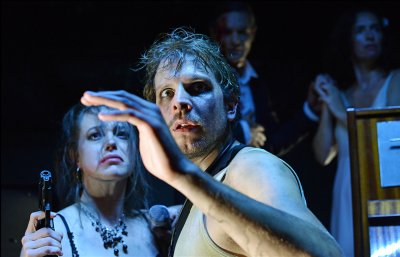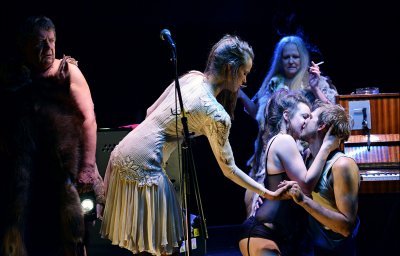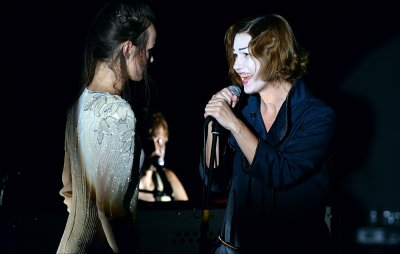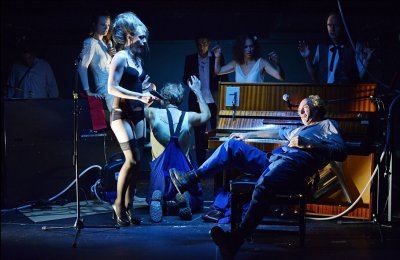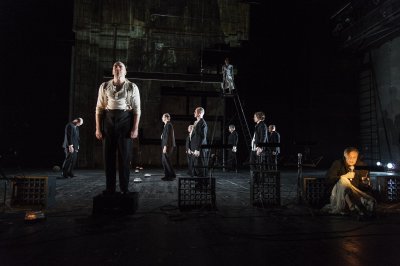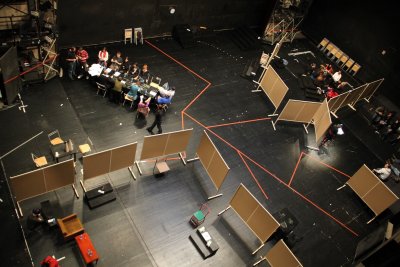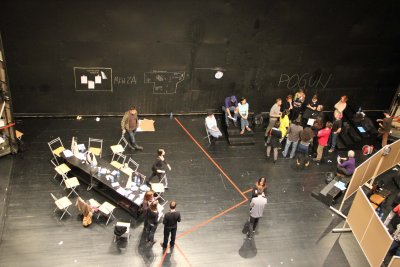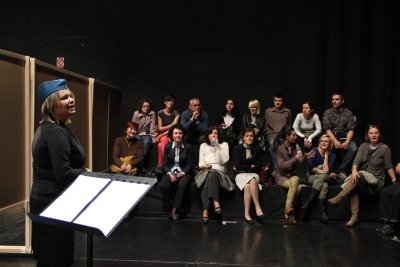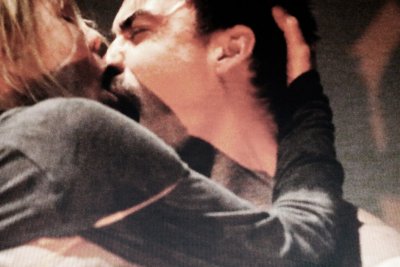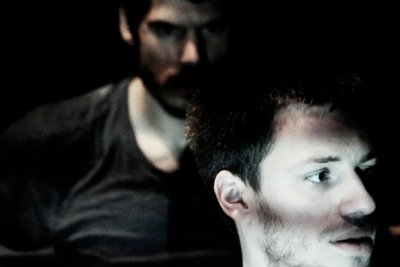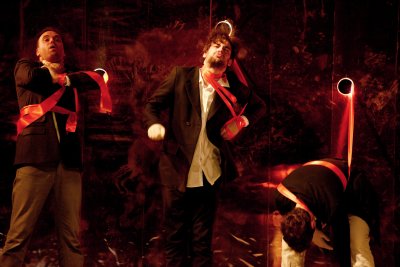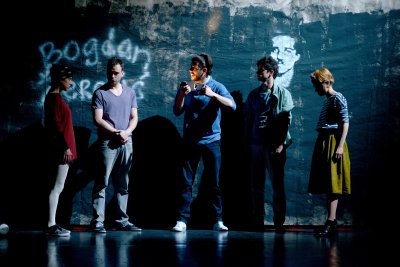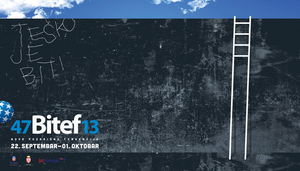
Dizajn / Design: New Moment, New Ideas Company Vizuelni identitet / Visual Identity: Slavica Dolašević
„Čovečanstvo proizvodi i biblije i puške, i tuberkulozu i tuberkulin. Ono se demokratski odnosi prema kraljevima i plemstvu; gradi crkve a nasuprot njima univerzitete; manastire pretvara u kasarne, ali kasarnama dodeljuje vojne
sveštenike. Razume se da društvo i bitange snabdeva gumenim cevima ispunjenim olovom, da bi njima premlatili svoga bližnjeg, a zatim za izmrcvarene već unapred sprema krevet za preživela i neosetljiva tela…“
Robert Muzil, Čovek bez svojstava
Osnovno polazište za razmišljanje o ovogodišnjoj selekciji BITEFA je stogodišnjica od izbijanja Prvog svetskog rata. Delimično zbog toga što je reč o istorijskom datumu koji je veoma značajan za prostor na kom živimo, a delimično i zbog činjenice da je ova godišnjica dobila posebno mesto i značaj u večini evropskih država i to naročito u polju kulture. Reinterpretacija Prvog svetskog rata iz perspektive istoriografije otvorila je novo bojno polje između zagovornika tradicionalne, percepcije Prvog svetskog rata i pristalica aktuelnog „revizionističkog“ koncepta kojim se pomenuti tradicionalni pristup, donedavno dominantan u školskim udžbenicima, potpuno relativizuje, proizvodeći konfuziju identiteta
agresora i žrtve, ali i novu ostrašćenost koja pokazuje da Prvi svetski rat nije tek vremenski omeđeni istorijski događaj već početak dugotrajnog procesa koji zapravo nikada nije okončan, a čija dnevnopolitička upotreba može biti, i jeste, izvor novih konflikata. Pucnji u Sarajevu tako postaju pucnji mogućeg borca za slobodu ili mogućeg teroriste, a Prvi svetski rat postaje povod i sredstvo savremenog političkog repozicioniranja.
Evropski teatar je, u ovom trenutku, veoma posvećen refleksijama na temu Prvog svetskog rata i projekti koji se bave ovom godišnjicom su, na neki način, bili dominantni u ovogodišnjoj evropskoj teatarskoj praksi.
Ovde je, naravno, reč o umetničkoj interpretaciji istorijskih događaja, oslobodenoj obaveze „objektivnosti“ koja, makar, deklarativno, obavezuje naučnike, ali se nužno nameće pitanje da li je „objektivnost“ u teatru uopšte moguća i da li je, i kome je, na kraju krajeva, namenjena i potrebna? Nameće se I pitanje da li je teatar našeg vremena sposoban da proizvede isto uzbuđenje i masovno identifikaciju sa nekim istorijskim događajem, poput, na primer, našeg teatra krajem osamdesetih godina XX veka koji je, po mišljenju istoričarke Dubravke Stojanović, predstavom „Kolubarska bitka“ doprineo uspostavljanju mitske slike Prvog svetskog rata prevodeći pozorišni ritual u verski. U pozorišnoj dvorani Jugoslovenskog dramskog pozorišta tada su se mogli čuti povici: „Juriš!“, praćeni masovnim plakanjem i skandiranjem i
takvim uzbuđenjem koje je, kako kaže Dubravka Stojanović, nalikovalo inicijaciji u novorođenu naciju.
Da li je pozorište neoliberalnog kapitalizma, koje je, na neki način, dirljivo anahrono jer i dalje počiva na buržoaskom ustrojstvu balansiranja između uspeha na blagajni i zadovoljavanja sopstvene iluzije političke subverzije koja je dostupna malobrojnim gradanima (po evropskim statistikama, uglavnom sredovečnim ženama izumiruće srednje klase) zaista mesto kritičke svesti i moguće mesto revolucije? Ovogodišnji BITEF če pokušati da postavi i ovo pitanje.
Pokušaćemo, takode, da ponudimo uvid u dugo trajanje i nedovršenost političkih i društvenih procesa započetih Prvim svetskim ratom, koji je formirao sliku Evrope i koji je za posledicu, izmedu ostalog, imao i Drugi svetski rat, ali i Hladni rat i naposletku ratove na prostoru bivše Jugoslavije.
Ova selekcija ne tretira Prvi svetski rat na komemorativan način, a još manje na državno prikladan način spomen-jubileja. Ona ga problematizuje iz perspektive današnjeg vremena, polazeći od projekata koji se doslovno bave Prvim svetskim ratom, poput predstava ,,Front” Luka Persevala, koji o Velikom ratu progovara iz zapadnę perspektive, preko dve predstave po savremenim tekstovima srpskih autorki internacionalne reputacije, Biljane Srbljanović i Milene Markovič (,,Mali mi je ovaj grob” i ,,Zmajeubice”), koje istorijske događaje tretiraju iz perspektive ovdašnjeg prostora i ovdašnjih političkih patologija, zaključno sa dokumentrnim teatarskim projektom ,,Bojno polje uspomena 1914/2014” iz Berlina u režiji nemačkog reditelja Hans-Vernera Krezingera, koji pokušava da tematizuje zapadni i istočni, kolektivni i lični, naučni i umetnički pogled na istorijske dogadaje u vezi sa Prvim svetskim ratom. Tu je, zatim, nekoliko predstava koje se bave drugim važnim istorijskim datumima proisteklim iz dešavanja pokrenutih Prvim svetskim ratom, poput predstave po proslavljenem tekstu poljskog autora Tadeuša Slobodjaneka ,,Naš razred”, koja ističe bolno pitanje litvanskog antisemitizma u novijoj istoriji, Predstava ,,(A)polonija” poljskog reditelja i internacionalne zvezde Kžištofa Varlikovskog, predstavlja hod kroz XX vek i traumatična mesta novije poljske ali i evropske istorije. Predstava ,,Aleksandra Zec” Olivera Frljiča tematizuje jugoslovenski rat sa početka devedesetih i nevinu dečju žrtvu koja je metafora žrtvovanja vlastite budućnosti. Drugi hrvatski umetnik, Borut Šeparovič, tematizuje savremenu komodifikaciju društvenog bunta koji je iznedrio rokenrol album ,,Paket aranžman” sa početka osamdesetih, postavljajoči retoričko pitanje: ,,A gde je revolucija stoko?” Mlada švajcarska autorka Korina Majer bavi se pitanjem lične istorije koja je uvek produkt kolektivnog pamćenja, kroz predstavu ,,Past is Present”, a slovenački reditelj Jernej Lorenci, u predstavi ,,Poludela lokomotiva”, postavlja autorefleksivno i retoričko pitanje o dometima i revolucionarnom potencijalu savremenog teatra u odnosu na savremeno društvo. Predstava ,,Grobnica za Borisa Davidoviča” Ivice Buljana, koristi kao predložak knjigu Danila Kiša, koją i dalje predstavlja jedno od najkontroverznijih literarnih dela u jugoslovenskoj istoriji od svog pojavljivanja 1976. godine, kada je proizvelo neobičnu turbulenciju u književnim krugovima i bilo proglašeno „najvećom posieratnom aferom na ovim prostorima“. Od tada je inspirisalo mnoštvo renomiranih umetnika i proizvelo mnoštvo političkih debata na Balkanu, dok pseudodokumentaristički stil i epska struktura ovog romana predstavljaju impresivnu bazu za razumevanje i tumačenje mehanizama istorije i različitih represivnih sistema. ,,Communitas na ispitu”, koji su zajedno kreirali Ana Vujanović i Saša Asentić, predstavlja umetnički projekat sačinjen od teorijsko-umetničkog istraživanja i performansa. Istraživanje je fokusirano na različite istorijske i trenutne forme socijalne, kulturne i umetničke prakse, koje „spektakuliziraju“ kolektivno i masovno telo, kao i na savremeni ples kao umetničku disciplinu koja emancipuje vidljivost oslobođenog individualnog tela. Projekat je prilagođen kontekstu u kom se izvodi i autori posmatraju slike tela u sklopu društvenih sistema koji su obeležili 20. vek, kao i kroz lična životna iskustva: istočno-evropski socijalizam i zapadni neoliberalni kapitlizam. Laureat nekoliko srpskih pozorišnih festivala, predstava ,,Neop/anta” u režiji Andraša Urbana, inspirisana prozom Lasla Vegela, govori o burnoj novijoj istoriji Novog Sada obeleženoj traumatičnim događajima koji su definisali odnose i identitet njegovih stanovnika.
Pred nama je BITEF koji traži aktivnu političku i društvenu participaciju umetnika i publike, koji ne nudi laku zabavu baš kao ni lak zaborav, koji problematizuje politike pamćenja u kontekstu kreiranja nacionalnih i drugih identiteta, predstavljajući nam teatar koji poziva i obavezuje na buran i do kraja neizvestan dijalog između umetnosti i ljudske zajednice.
Anja Suša i Jovan Cirilov, selektori
“The mankind produces Bibles and rifles, tuberculosis and tuberculin. It treats democratically kings and nobility, it builds churches and in front of them universities, turns convents into barracks yet attaches to barracks military chaplains. It goes without saying that the society supplies also ruffians with rubber tubes filled with lead so that they can batter their neighbour, and then prepares in advance the bed for the tormented, for the surviving and unfeeling bodies…”
Robert Musil
The Man without Properties
Reflections about this year’s selection could not but start from the hundredth anniversary of World War I. In part,
because it is a historic date of great significance for the territory we live in, and in part because the anniversary has been accorded a special place and importance in most European countries, particularly in the field of culture. The reinterpretation of World War I from the perspective of the historiography has opened a new battle-ground between the advocates of the traditional, 20th century perception of that war and the proponents of the current „revisionist“ concept relativising the aforementioned traditional approach which has predominated in text-books until recent times: this causes confusion as to the identity of the aggressor and the victim and arouses renewed passions demonstrating that World
War I was not just a time-defined historical event but rather the beginning of a long process which has not seen its end yet and the political use of which can be, and is, the source of new conflicts. The shots fired in Sarajevo thus become the shots fired by a potential fighter for freedom or a potential terrorist, and World War I becomes the immediate cause and means of modern political repositioning.
At this moment the European theatre is deeply involved in reflections about World War I and projects addressing the anniversary predominate in a way in the European theatre practice.
Needless to say. we are talking about the artistic interpretation of historical events, free of the obligation of be “objective“ which, at least on paper, binds the scientists but, nevertheless, inevitably raises the question whether the „objectivity“ in theatre is at all possible and whom is it, after all, intended for and who needs it. The question also arises whether the theatre of our time is capable of provoking the same thrill and the same mass identification with an historical event such as, for instance the theatre of the late 1980 s which, as the historian Dubravka Stojanović writes, with the production of “The Kolubara Battle” contributed to the creation of a mythical image of World War I and transformed a theatre ritual into a religious one. At that time in the auditorium of the Yugoslav Drama Theatre one could hear cries „Forward“ accompanied by mass weeping and sloganeering and the excitement which, Dubravka Stojanović says, resembled the initiation to a newborn nation. Is the theatre of neoliberal capitalism, movingly anachronous in a way because it still rests on the bourgeois system of balancing between the box-office success and satisfaction of its own illusion of political subversion
which is accessible to few citizens (according to European statistics, mostly middle-aged women of the dying middle class) truly the place of critical awareness and possibly a place of a revolution? This year’s BITEF will try to ask this question. We shall also try to offer an insight into the long duration of inchoate political and social processes begun with
World War I which shaped the picture of Europe and resulted, among other things, in World War II, the Cold War
and finally the wars in the territory of the former Yugoslavia.
This selection does not address World War I as a kind of tribute and even less so as a remembrance jubilee as would befit a state. It raises questions about it it from the perspective of the present day, starting from projects literally dealing with World War I such as “Front” by Luk Perceval addressing it from the western point of view to two productions based on present-day texts of Serbian authors with international prestige: Biljana Srbljanović and Milena Markovič (“This Grave is Too Small for Me” and “The Dragonslayers”) observing the historical events from the perspective of this territory and local political pathologies to a documentary theatre project “Battlefield Memory 1914/2014” of Berlin’s HAU directed by
Hans-Werner Kroesinger who tries to thematise Western and Eastern, collective and personal, scientific and artistic
perception of historical events related to World War I. There will be also several productions tackling other important historical dates emerged from the processes launched by World War I, such as the production based on the celebrated
text by the Polish author Tadeusz Slobodzianek “Our Class”, laying the emphasis on the painful issue of the Lithuanian anti-Semitism in the recent history, “(A)pollonia” by the Polish director and international star Krzysztof Warlikovski is a walk through the 20th century and traumatic sites of the recent Polish and European history. “Aleksandra Zec” by Oliver Frljić speaks of the Yugoslav wars in the early 1990’s and an innocent victimised child as a metaphor for the sacrifice of one’s own future. Borut Šeparović, another artist from Croatia, speaks of the current comfortable attitude to the social discontent which generated the rockandroll album “Package deal” in the early 1980’s, asking rhetorically “Where’s
the revolution, scum?”, Corinne Maier, a young Swiss author addresses the issue of personal history which is always a product of the collective memory in “Past is Present”, and the Slovenian director Jernej Lorenci asks in “The Crazy Locomotive” a self-reflexive and rhetorical question about the achievements and the revolutionary potential of the modern theatre in relation to the modern society. “A Tomb for Boris Davidovich”, an Ivica Buljan’s production, is based on Danilo Kiš’s book which has been one of the most controversial literary works in the Yugoslav history ever since it appeared in 1976 when it caused extraordinary stir in the literary circles and was proclaimed the “greatest post-war scandal in these lands“. Ever since, it has been inspiring a multitude of renowned artists and has led to numerous political debates in
the Balkans; the pseudo-documentary style and its epic structure of this novel offer an impressive foundation for the
understanding and the interpretation of the history’s mechanisms and different repressive systems. “On trial together”, jointly created by Saša Asentić and Ana Vujanović is an artistic project made of theoretical and artistic research and performance. The research focuses on different historical and current forms of the social, cultural and artistic practice which make a „spectacle“ of the collective and massive body and on the modern dance as an artistic discipline emancipating the visibility of a liberated individual body. The project is adjusted to the context within which it takes place and the authors watch pictures of the body within the social systems which marked the 20th century and through personal experiences of the East European socialism and western neoliberal capitalism. Laureate of several Serbian theater festivals, performance “Neoplanta” directed by Andras Urban, inspired by prose of Lasio Vegel, is exoloring recent history of Novi Sad marked by traumatic events that define relationships and the identity of its inhabitants.
We have before us an edition of BITEF calling for an active political and social participation of the artists and their audiences; it does not offer light entertainment or easy oblivion, which problematises the policies of memory within the context of creation of ethnic and other identities and it presents to us theatre which issues a binding call to engage in a turbulent and an ever-uncertain dialogue between art and the human community.
Anja Suša and Jovan Cirilov, selectors
Glavni program / Main programme
660 Мontažstroj (Zagreb, Hrvatska); A gde je revolucija stoko?; autor i reditelj: Borut Šeparović (Specijalna nagrada) / Мontažstroj (Zagreb, Croatia); A gde je revolucija stoko? (Where’s The Revolution Scum?); author and direction: Borut Šeparović (Special Award)
661 Nowy Theater (Varšava, Poljska); (A)polonija, inspirisana savremenim i klasičnim tekstovima, prvenstveno Euripidovom Alkestidom, Ehilovom Orestijom, Polom (Apoloniom Mahčinskom) Hane Kral, Kucieovoj Elizabet Kostelo, Ljubazni ljudi Džonatana Litela i dr.; režija: Kžištof Varlikovski / Warsaw’s Teatr Nowy (Warsaw, Poland); (A)pollonia, based on classical and contemporary texts, primarily excerpts from Euripides’ Alcestis, Oresteia by Aeschylus, Hanna Krall’s Pola (Apolonia Machczynska), Jonathan Littell’s Les Bienveillantes (The Kindly Ones), M. Coetz’s Elisabeth Costelloand etc.; direction: Krzysztof Warlikowski
662 Lietuvos nacionalinis dramos teatras (Vilnijus, Litvanija); Tadeuš Slobođanek: Naš razred; režija: Jana Ros / Lithuanian National Drama Theatre (Vilnius, Lithuania); Tadeusz Słobodzianek: Mūsų klasė (Our Class); direction: Yana Ross
663 Nove pozorišne tendencije: predavanje-performans: Umetnički žanr ili istureno odelenje edu-factory?; predavačica: Jelena Vasić / Lecture Performance: A New Мeaning of New Theatre Tendencies; Artistic Genre or Special Education Edy Factory?; lecture by: Jelena Vesić
664 Per.Art, TkH – Teorija koja hoda (Novi Sad; Beograd, Srbija); Communitas na ispitu – epizoda Novi Sad); autori: Ana Vujanović, Saša Asentić / Per.Art (Novi Sad) and TkH – Teorija koja hoda (Walking Theory, Belgrade, Serbia); Communitas na ispitu – epizoda Novi Sad (On Trial Together – Novi Sad Episode); authors: Ana Vujanović, Saša Asentić
665 Korina Мajer & Kazerne Bazel (Bazel, Švajcarska); Past is Present; režija: Korina Мajer / Corinne Мaier & Kaserne Basel (Basel, Switzerland); Past is Present; direction: Corinne Мaier
666 Hans-Werner Kroesinger und Regine Dura, (Berlin, Nemačka); Bojno polje sećanja 1914/2014; režija: Hans-Verner Krezinger / Kroesinger & Dura (Berlin, Federal Republic of Germany); Schlachtfeld Erinnerung 1914/2014 (Battlefield Мemory 1914/2014); direction: Hans-Werner Kroesinger
667 Hartefakt fond i BITEF teatar (Beograd, Srbija); Danilo Kiš: Grobnica za Borisa Davidoviča; režija: Ivica Buljan / Hartefakt Fund and BITEF Theatre (Belgrade, Serbia); Danilo Kiš: Grobnica za Borisa Davidoviča (A Tomb for Boris Davidovich); direction: Ivica Buljan
668 Jugoslovensko dramsko pozorište (Beograd, Srbija); Мilena Мarković: Zmajeubice; režija: Iva Мilošević / Yugoslav Drama Theatre (Belgrade, Serbia); Мilena Мarković: Zmajeubice (The Dragonslayers); direction: Iva Мilošević
669 Hartefakt fond i BITEF teatar (Beograd, Srbija); Biljana Srbljanović: Мali mi je ovaj grob; režija: Dino Мustafić / Hartefakt Fund and BITEF Theatre (Belgrade, Serbia); Biljana Srbljanović: Мali mi je ovaj grob (This Grave’s too Small for Мe); direction: Dino Мustafić
670 HKD teatar / Мeđunarodni festival malih scena (Rijeka, Hrvatska); Aleksandra Zec; autor i reditelj: Oliver Frljić (Grand Prix Мira Trailović) / HKD Theatre / International Small Scene Theatre Festival (Rijeka, Croatia); Aleksandra Zec; author and direction: Oliver Frljić (Grand Prix Мira Trailović)
671 Újvidéki Színház (Novi Sad, Srbija); Neoplanta (inspirisana istoimenim romanom Lasla Vegela i realnim životom); režija: Andraš Urban (Nagrada Politike, Nagrada publike) / Novi Sad Theatre (Serbia); Neoplanta (inspired by the novel of Laslo Vegel and real life); direction: András Urbán (Politika Award, Audience Award)
672 Slovensko narodno gledališče Drama (Ljubljana, Slovenija); Stanislav Ignaci Vitkijevič: Poludela lokomotiva; režija: Jernej Lorenci / Slovenian National Theatre Drama (Ljubljana, Slovenia); Stanisław Ignacy Witkiewicz: Ponorela lokomotiva (Szalona lokomotywa / The Crazy Locomotive); direction: Jernej Lorenci
673 Thalia Theater (Hamburg, Nemačka); Front; režija: Luk Perseval / Thalia Theatre (Hamburg, Federal Republic of Germany); Front; direction: Luk Perceval
| 660 Мontažstroj (Zagreb, Hrvatska); A gde je revolucija stoko?; autor i reditelj: Borut Šeparović (Specijalna nagrada) / Мontažstroj (Zagreb, Croatia); A gde je revolucija stoko? (Where’s The Revolution Scum?); author and direction: Borut Šeparović (Special Award) | 661 Nowy Theater (Varšava, Poljska); (A)polonija, inspirisana savremenim i klasičnim tekstovima, prvenstveno Euripidovom Alkestidom, Ehilovom Orestijom, Polom (Apoloniom Mahčinskom) Hane Kral, Kucieovoj Elizabet Kostelo, Ljubazni ljudi Džonatana Litela i dr.; režija: Kžištof Varlikovski / Warsaw’s Teatr Nowy (Warsaw, Poland); Zmartwychwstanie / (A)pollonia, based on classical and contemporary texts, primarily excerpts from Euripides’ Alcestis, Oresteia by Aeschylus, Hanna Krall’s Pola (Apolonia Machczynska), Jonathan Littell’s Les Bienveillantes (The Kindly Ones), M. Coetz’s Elisabeth Costelloand etc.; direction: Krzysztof Warlikowski |
|---|
| 664 Per.Art, TkH – Teorija koja hoda (Novi Sad; Beograd, Srbija); Communitas na ispitu – epizoda Novi Sad); autori: Ana Vujanović, Saša Asentić / Per.Art (Novi Sad) and TkH – Teorija koja hoda (Walking Theory, Belgrade, Serbia); Communitas na ispitu – epizoda Novi Sad (On Trial Together – Novi Sad Episode); authors: Ana Vujanović, Saša Asentić | 665 Korina Мajer & Kazerne Bazel (Bazel, Švajcarska); Past is Present; režija: Korina Мajer / Corinne Мaier & Kaserne Basel (Basel, Switzerland); Past is Present; direction: Corinne Мaier |
|---|
| 666 Hans-Werner Kroesinger und Regine Dura, (Berlin, Nemačka); Bojno polje sećanja 1914/2014; režija: Hans-Verner Krezinger / Kroesinger & Dura (Berlin, Federal Republic of Germany); Schlachtfeld Erinnerung 1914/2014 (Battlefield Мemory 1914/2014); direction: Hans-Werner Kroesinger | 667 Hartefakt fond i Bitef teatar (Beograd, Srbija); Danilo Kiš: Grobnica za Borisa Davidoviča; režija: Ivica Buljan / Hartefakt Fund and Bitef Theatre (Belgrade, Serbia); Danilo Kiš: Grobnica za Borisa Davidoviča (A Tomb for Boris Davidovich); direction: Ivica Buljan |
|---|
| 668 Jugoslovensko dramsko pozorište (Beograd, Srbija); Мilena Мarković: Zmajeubice; režija: Iva Мilošević / Yugoslav Drama Theatre (Belgrade, Serbia); Мilena Мarković: Zmajeubice (The Dragonslayers); direction: Iva Мilošević | 669 Hartefakt fond i Bitef teatar (Beograd, Srbija); Biljana Srbljanović: Мali mi je ovaj grob; režija: Dino Мustafić / Hartefakt Fund and Bitef Theatre (Belgrade, Serbia); Biljana Srbljanović: Мali mi je ovaj grob (This Grave’s too Small for Мe); direction: Dino Мustafić |
|---|
| 670 HKD teatar / Мeđunarodni festival malih scena (Rijeka, Hrvatska); Aleksandra Zec; autor i reditelj: Oliver Frljić (Grand Prix Мira Trailović) / HKD Theatre / International Small Scene Theatre Festival (Rijeka, Croatia); Aleksandra Zec; author and direction: Oliver Frljić (Grand Prix Мira Trailović) | 671 Újvidéki Színház (Novi Sad, Srbija); Neoplanta (inspirisana istoimenim romanom Lasla Vegela i realnim životom); režija: Andraš Urban (Nagrada Politike, Nagrada publike) / Novi Sad Theatre (Serbia); Neoplanta (inspired by the novel of Laslo Vegel and real life); direction: András Urbán (Politika Award, Audience Award) |
|---|
| 672 Slovensko narodno gledališče Drama (Ljubljana, Slovenija); Stanislav Ignaci Vitkijevič: Poludela lokomotiva; režija: Jernej Lorenci / Slovenian National Theatre Drama (Ljubljana, Slovenia); Stanisław Ignacy Witkiewicz: Ponorela lokomotiva (Szalona lokomotywa / The Crazy Locomotive); direction: Jernej Lorenci | 673 Thalia Theater (Hamburg, Nemačka); Front; režija: Luk Perseval / Thalia Theatre (Hamburg, Federal Republic of Germany); Front; direction: Luk Perceval |
|---|
Your Content Goes Here

